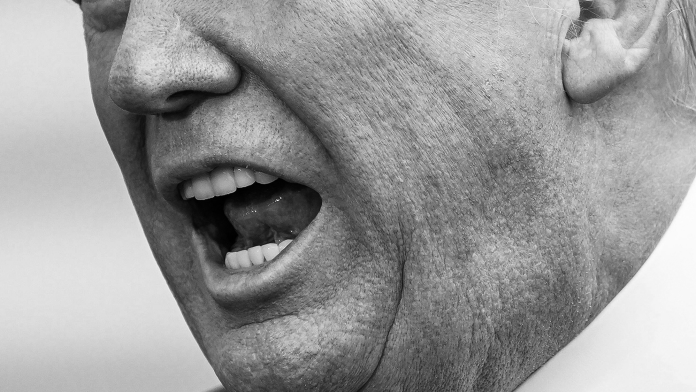Editor’s Note: This article is part of “If Trump Wins,” a project considering what Donald Trump might do if reelected in 2024.
“We pledge to you that we will root out the Communists, Marxists, fascists, and the radical-left thugs that live like vermin within the confines of our country, that lie and steal and cheat on elections,” Donald Trump said this past November, in a campaign speech that was ostensibly honoring Veterans Day. “The real threat is not from the radical right; the real threat is from the radical left … The threat from outside forces is far less sinister, dangerous, and grave than the threat from within. Our threat is from within.”
[David A. Graham: Trump says he’ll be a dictator on “day one”]
What immediately leaps out here is the word vermin, with its echoes of Hitler and Mussolini. But Trump’s inflammatory language can overshadow and distract from the substance of what he’s saying—in this case, appearing to promise a purge or repression of those who disagree with him politically.
This sort of language isn’t entirely new. Trump spoke in Manichaean terms throughout his first campaign and term, encouraging chants to lock up Hillary Clinton in 2016, and in 2018 referring to undocumented immigrants as “animals” who would “infest our country.” Over time, the shock of Trump’s rhetoric has worn off, making it easy to miss the fact that his message has grown even darker.
Trump himself has changed, too—the old Trump seemed to be running for office partly for fun and partly in service of his signature views, such as opposition to immigration and support for protectionism. Today’s Trump is different. His fury over his 2020 election defeat, the legal cases against him, and a desire for revenge against political opponents have come to eclipse everything else.
[From the January/February 2024 issue: David Frum on the revenge presidency]
In the past few months, the former president has described himself as a “very proud election denier.” He has repeatedly threatened and intimidated judges, witnesses, prosecutors, and even the family of prosecutors involved in the cases against him, going so far as to say that his legal opponents will be consigned to mental asylums if he’s reelected. He has suggested that the man he picked for chairman of the Joint Chiefs of Staff deserves to be executed on grounds of treason. He’s called for investigating NBC and possibly yanking the network off the air, also on grounds of treason—one of his most direct attacks on the First Amendment. And he’s vowed to arrest and indict President Joe Biden and other political opponents for no apparent reason other than that they oppose him.
The fact that Trump’s ideas have become more authoritarian is not yet fully appreciated. One reason is people have heard Trump say outlandish things for so long that they can’t identify what’s new, or they’ve become numb. Another is venue: Once Trump left the White House and stopped tweeting, his vitriol became less noticeable to anyone who didn’t attend his rallies, seek out videos of them, or join Trump’s own Truth Social network.
Even when a comment is so extreme that it does break into the mainstream, what happens next is predictable. The first time Trump says something, people react with shock and compare him to Hitler. The second time, people say Trump is at it again. By the third time, it becomes background noise—an appalling but familiar part of the Trump shtick.
[David A. Graham: Trump isn’t merely unhinged]
This is just the sort of “normalization” that Trump’s critics warned against from the start, but it’s also a natural human response to repeated exposure. The result is that Trump has been able to acclimate the nation to authoritarianism by introducing it early and often. When a second-term President Trump directs the Justice Department to lock up Democratic politicians or generals or reporters or activists on flimsy or no grounds at all, people will wring their hands, but they’ll also shrug and wonder why he didn’t do it sooner. After all, he’s been promising to do it forever, right?
This article appears in the January/February 2024 print edition with the headline “Trump Isn’t Bluffing.”

















